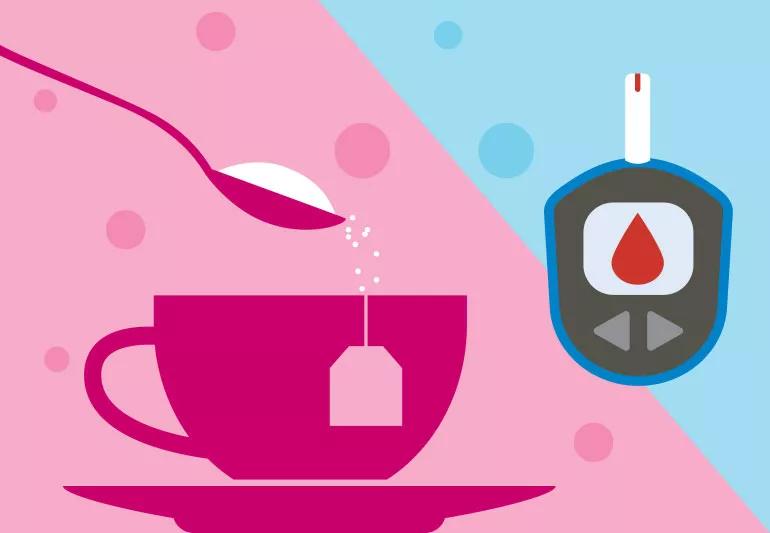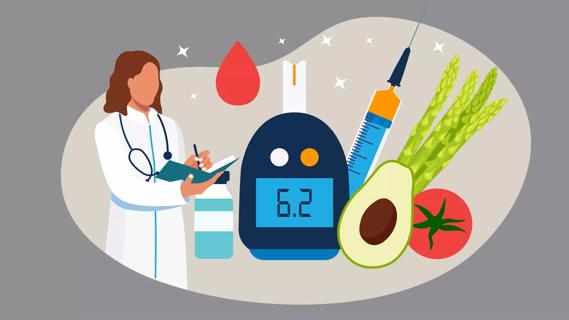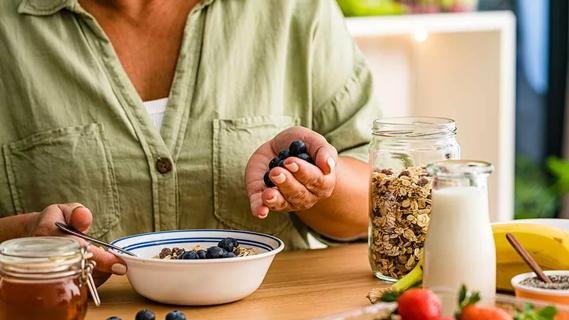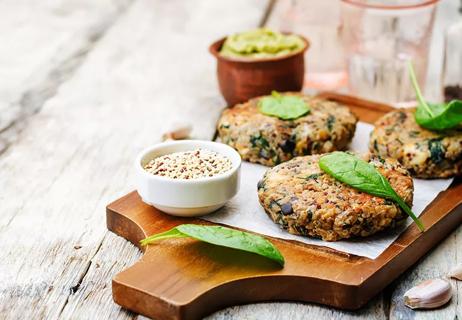Some sweeteners may have health risks, so it’s best to keep your intake moderate

If you’re living with diabetes, you know limiting your sugar intake is important for managing your health. So, you do your best to cut out the added sugars and the simple carbs.
Advertisement
Cleveland Clinic is a non-profit academic medical center. Advertising on our site helps support our mission. We do not endorse non-Cleveland Clinic products or services. Policy
And we know it’s not always easy.
So, when your sweet tooth comes calling, you naturally turn to food and drinks made with artificial sweeteners, right? Sweet taste, virtually calorie-free and all without spiking your blood sugar? Sounds like a dream come true.
“Used in moderation, artificial sweeteners can be safe for people with diabetes, and they can be used to reduce both your calorie and carbohydrate intake,” explains diabetes educator Sue Cotey, RN, CDCES. “Sugar substitutes also can help curb those cravings you have for something sweet.”
But as Cotey notes, that doesn’t mean foods made with artificial sweeteners are a particularly healthy choice.
For starters, you still need to focus on following a diabetes-friendly diet.
What’s more, some research shows certain sweeteners have been linked to health risks like cancer, heart attacks and stroke.
Does that mean you immediately need entirely cut out all sweeteners from your diet?
Probably not. But you should be thoughtful about how much artificial sweetener you eat.
Here, Cotey, along with Andrea Harris, RN, CDCES, also a diabetes educator, discuss some of the latest understanding about artificial sweeteners and share advice for people living with diabetes.
Advertisement
Artificial sweeteners are popular among people with diabetes. They add sweet flavors to your foods without impacting your blood sugar in the way added sugars do. And many have zero calories.
You’ll find artificial sweeteners foods like:
You can also find them as stand-alone sweeteners in those various colored packages to add to your coffee or tea. Some are also available for cooking and baking.
Six artificial sweeteners have been tested and approved by the U.S. Food and Drug Administration (FDA) or placed on the agency’s Generally Recognized as Safe (GRAS) list.
“Artificial sweeteners undergo rigorous testing to confirm they are safe for consumption,” Harris says. “Being classified as GRAS means that, given the science we have, these products haven’t been proven to be harmful when used as intended.”
Sure, that’s a far cry from “health food” status. But it’s pretty clear indication the FDA doesn’t find artificial sweeteners to be wholly dangerous, especially if you don’t go overboard with them.
But in recent years, some research has shown some potential risks for some artificial sweeteners. Research is still ongoing, and some opinions vary regarding their use.
What does that mean for people with diabetes? Let’s dive a little deeper into some of the most common artificial sweeteners.
Also goes by: Equal® and “the blue packet.”
More than 200 studies support the safety of aspartame. But some recent results have been mixed. In 2023, a study of more than 100,000 people followed over eight years led the World Health Organization (WHO) to declare aspartame a possible cause of cancer.
For perspective, it’s listed as a Group 2B carcinogen, alongside things like lead and car exhaust. It’s a designation that means there’s evidence to support the idea that aspartame may be cancer-causing in certain situations, but there’s not yet enough evidence to know for sure.
“What is known is that aspartame is a source of phenylalanine, which is an ingredient people with phenylketonuria (PKU) should avoid,” Cotey explains. Packages of aspartame include that warning.
Aspartame isn’t heat-stable, so it’s not the best choice for baking or cooking.
Also goes by: Sweet ‘N Low®, Sweet Twin®, Sugar Twin® and “the pink packet.”
Non-human studies in the 1970s linked saccharin to bladder cancer. But they were dismissed by the FDA, as they weren’t relevant to people.
Saccharin is heat stable and a good choice for use in cooking, baking, canning and preserving.
Advertisement
Also goes by: Splenda®, N’Joy® and “the yellow packet.”
Like saccharin, sucralose is heat stable and easy to use in baking and cooking. It’s available to buy in dissolvable tablets, granular tablets and baking blends.
Also called: A Sweet Leaf®, Sun Crystals®, Truvia®, PureVia® and “the green packet.”
“Unlike most other artificial sweeteners, which are chemically manufactured, stevia is a sweetener derived from a plant,” Harris explains.
Some stevia products — ones that are created from whole stevia leaves — haven’t received GRAS status. They’re sold as dietary supplements, which don’t have to undergo rigorous scientific testing to prove their safety.
Other products — ones used as sweeteners in foods and beverages — have GRAS status. However, some stevia products include a sugar alcohol called erythritol, which has been linked to increased risk of heart attack and stroke. Research regarding this connection is ongoing.
Stevia comes in liquid and dissolvable tablets, as well as crystals.
Also goes by: Sunett®, Sweet One® and Ace-K.
Acesulfame-potassium is generally blended with another low-calorie sweetener.
It’s stable under heat, even under moderately acidic or basic conditions. It’s commonly used as a food additive in baking, or in products that require a long shelf life. In carbonated drinks, it’s almost always used in conjunction with another sweetener.
Advertisement
This product is mainly used by large food manufacturers, rather than a sweetener you’ll find at your local coffee shop or on grocery store shelves.
Neotame has 7,000 to 8,000 the sweetening power of sugar.
Like aspartame, neotame also contain phenylalanine. But it contains far less, so it doesn’t require a warning on its label.
In a perfect world, we’d all avoid added sugars and artificial sweeteners. Your body doesn’t need sugar or artificial sweetener to keep you healthy. They have zero health benefits. They’re just not something that needs to be part of your diet.
In reality, though, an occasional sweet treat is just nice to have sometimes.
“Living with diabetes can come with major shifts in your eating habits,” Cotey notes. “Asking people to make a change like avoiding all sugar and all artificial sweeteners is a big ask. One that a lot of people won’t successfully keep up long-term.”
Most of the risks associated with artificial sweeteners are based on consuming very high quantities over long periods of time. So, Cotey and Harris’s best advice is to be thoughtful about your consumption. Keep your intake low, rather all-out banning sweetened foods.
“People with diabetes should be focused on eating well-balanced and properly portioned meals and snacks,” Harris states.
Advertisement
“Make sure you’re getting plenty of lean protein, non-starchy vegetables, healthy fats and complex carbs. And if you want a piece of sugar-free pie at a family celebration, you can. Just be thoughtful about your intake.”

Sign up for our Health Essentials emails for expert guidance on nutrition, fitness, sleep, skin care and more.
Learn more about our editorial process.
Advertisement

Hot, humid weather can affect your blood sugar levels and even cause dehydration or heat stroke

The good news? Prediabetes can be erased with healthy lifestyle changes, including eating more nutritious foods

Fresh or frozen fruits that are low on the glycemic index should be your go-to, as they’re full of fiber and other nutrients

Adding nuts like pistachios, almonds or pecans to your diet can help manage blood sugar levels

A diabetes diagnosis, new or long-standing, can trigger reactions like grief, stress, depression and frustration, but symptom relief and help are available

The short answer: Yes, but you need to eat it in moderation and keep track of how much you consume

Sweet potatoes are great, but sweetened drinks aren’t so great

Lifestyle changes like diet and exercise can help

The tropical fruit is a good source of antioxidants and vitamin C

Most people fall asleep within 10 to 20 minutes, but if your experience is different, adjusting your sleep schedule may help

Exploring your hidden side can lead to better understanding of what makes you tick